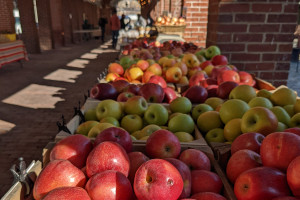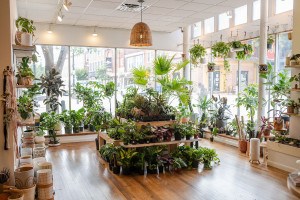Meet the Local Sisters Behind Rittenhouse’s New Herbal Wellness Shop
Nakia and Taahirah Stith share their journey of opening urban plant-based apothecary Dope Botanicals.

Dope Botanicals founders Nakia and Taahirah Stith. / Photograph by Ron Hill Media
Like many other age-old practices, herbalism — or using organic and/or ethically foraged plants to treat ailments and improve overall wellness — has experienced a modern renaissance due to the pandemic. It has been especially popular here in Philly thanks to a growing number of plant-centric businesses and workshop organizers.
Contributing to the scene is Dope Botanicals, an herbal shop that opened in Rittenhouse about two months ago. Founded by Philly natives and sisters Nakia and Taahirah Stith, the a‘plant’ecary (a.k.a. an apothecary full of plant-based remedies) is home to hand-blended herbal products like lattes, smoothies, tonics, teas and tinctures.
We chatted with the Stith sisters to find out how they got into herbal medicine, what sets Dope Botanicals apart, and what they hope to contribute to Philly’s wellness scene.
What led you both to start practicing herbalism?
Nakia: I don’t know when we’ve not been into herbal medicine. Before Taahirah was born (we’re 13 years apart), our dad came home one day and said we were going to overhaul our eating — herbs played a large role in that change. I was about 10 years old at the time. So when Taahirah came along, she didn’t have any transition like I did; plant-based was just how our family ate.
Was there a reason your dad pretty much uprooted your diet?
Nakia: Our parents were young parents, raising me (and later, Taahirah and our brother) at a time when people had a mindset of “do for self” and “do for community.” In order to do those things, you have to have a healthy mind and body, and I think our dad was learning that we could be improving our whole health through better consumption. Plus, our dad was an entrepreneur — he created his own security business. Having us go plant-based was a big part of his creating strong roots in activism, community empowerment, and being self-starters.

Dope Botanicals’ product line. / Photograph by Ron Hill Media
How did that manifest for you as you grew up?
Taahirah: Going to school in the Philadelphia school system with alfalfa sprouts on your sandwich wasn’t really the thing other kids my age were doing. [Laughs]
Nakia: Yeah, we were always a bit different, but we owned it. As time went on, we became known in our community for our plant-based meals and juices. We even started selling our creations at a Bikram yoga studio in West Philly a few years ago, which became a hit to the point we had a following. People were texting us on a weekly basis asking for our food.
Taahirah: We became health coaches soon after because of the community demand. We wanted to be formally trained before giving out advice to others, especially as we realized people needed more than just healthy meals.
What did they need?
Nakia: When we’d talk with people, we understood that they weren’t just interested in eating better. They wanted to improve other areas of their lives, like sleep, gut health and menstruation cycles. It dawned on us that there’s a disconnect between eating and whole health, and that wellness is about more than just food — it’s about consumption. (You can be a sloppy vegan!) There are everyday stressors involved with living in a city environment that can directly impact your wellness. So we started asking ourselves questions like, “What is holistic wellness?” and “What does it mean to be whole?” Self-care is a big movement everyone’s talking about, but self-care is an actionable item. There are things that we have to do in order to feel better — and not just drink a green smoothie.
I was in Reiki healing training at the time, and decided to also go into an herbal program. Herbs were such a big part of our lives, and we knew firsthand they had major benefits to wellness. We eventually launched Beans + Brains — our business for making food and juices, and providing health coaching — around 2016.
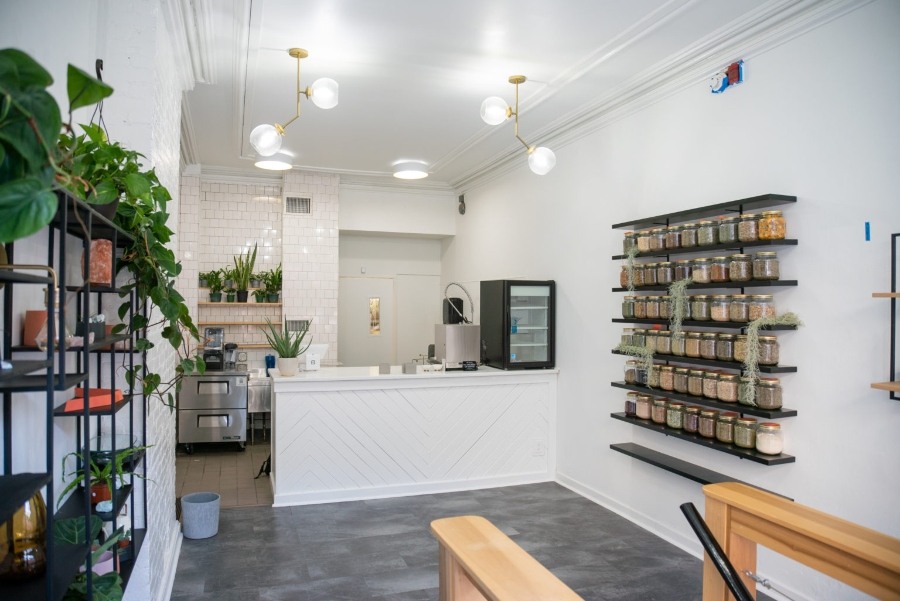
The interior of Dope Botanicals. / Photograph by Cory J. Popp
It seems like you became organic (no pun intended) leaders for plant-based wellness. Is that what drew you to opening a storefront?
Taahirah: The idea of having our own shop started to germinate from launching Beans + Brains. We were looking for a space for about five years, but couldn’t quite find the right location for us. Plus, we thought that people would think we were a coffee shop if we named our shop Beans + Brains. We were brainstorming ideas and I said, “Well, we make dope botanicals …” and it just made sense to have that be our DBA.
Nakia: We wanted a brick-and-mortar, too, because there aren’t many herbal wellness shops in Philly. This city has a long tradition of juice bars, which is okay! But we wanted to broaden Philly’s mentality and awareness with a plant apothecary (what we call an a‘plant’ecary) — a cool herb shop you can go to where someone can help you relieve what’s bothering you, you can get a really good beverage, and you feel like you want to stay there. We knew we had the opportunity to create something new and special utilizing our backgrounds that felt like an extension of city life, rather than something that feels out of place in the nitty gritty. When you come in, you might hear some WuTang with your wellness!
Where do you get the herbs from?
Nakia: All of our herbs are either in a liquid form, powder form, or cut form (aka herbal teas or things you’re going to use for infusions). We’ve been working with farms everywhere from Vermont to Washington state. We also try to obtain herbs from their location of origin, and everything we use is certified organic or wild-crafted, meaning that somebody responsibly picked them. Locally, we hope to work with a farm in Doylestown soon. And hopefully we’ll eventually have our own farm!
Taahirah: We also don’t rush any process. We make most of our creations in the back and let the herbs do their thing for as long as they need. Also, all the tinctures, syrups, smoothies, teas and elixirs we formulate, strain, blend, label and sell, we’ve been in contact with. Nothing bypasses us.
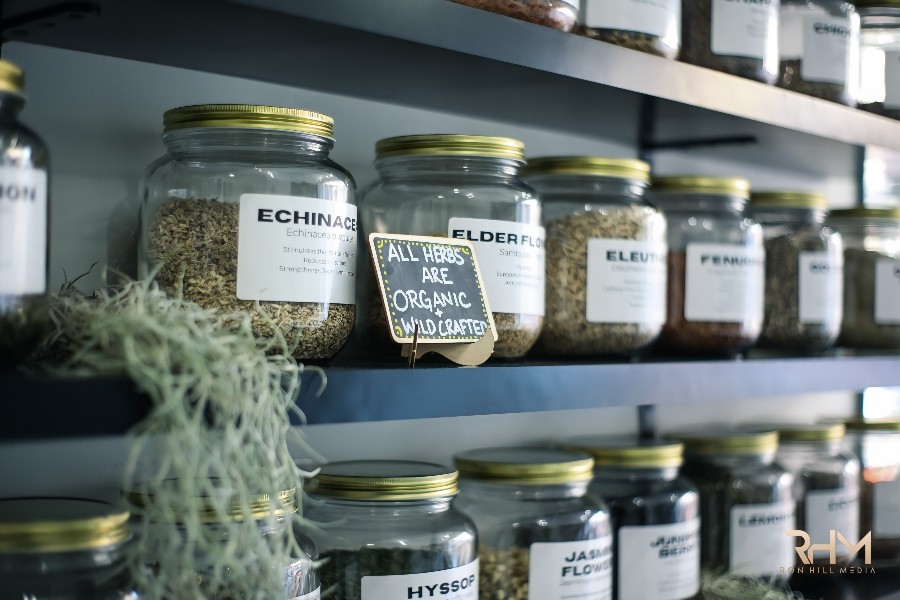
The herbal wall at Dope Botanicals. / Photograph by Ron Hill Media
What can a customer expect when they visit Dope Botanicals?
Taahirah: If someone comes in with an acute or serious issue, we’ll have them go through an herbal consultation with us so we can create solutions that work for their specific needs. It’s a more holistic approach in that case. We also have customized herb blends and teas at our herbal bar. I’ll ask you, “How would you like to feel?” because a lot of people aren’t familiar with what herbs help with certain ailments. Someone might just say they want to feel good, and I’ll make you our “Happy Pill” adaptogenic latte. It contains shatavari, mucuna and ashwagandha. Shatavari is an Ayurvedic herb that supports healthy hormone levels, improves vigor, vitality, and relieves nervousness. Mucuna is a natural source of the amino acid L-Dopa, which is the precursor to dopamine, the neurotransmitter that ignites pleasure, bliss and joy. And ashwagandha can lower cortisol levels, increase cognition, reduce stress and stabilize mood. You really will feel good after sipping it!
Nakia: Other important things about us: We don’t use coffee, sell CBD or allow substitutions. We knew with the herbal bar, we didn’t want it to become a smoothie place or a coffee bar where people are adding or eliminating ingredients. That’s new to some people, and it’s just a learning experience. The idea is that “No, you cannot add Spirulina to that smoothie!”
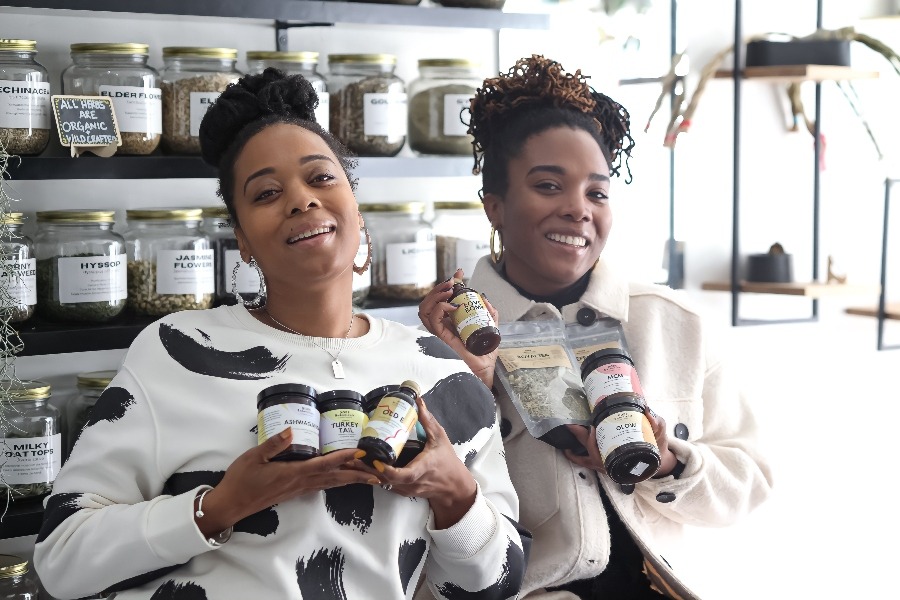
Sisters Nakia and Taahirah Stith with their herbal remedies. / Photograph by Ron Hill Media.
Why is that? I’m a newbie at this.
Nakia: A lot of times, people come into the shop and have no idea where to begin or how to use our products. And it’s so great to hear customers say they trust us in helping make them feel better. They know we’re not doing “kitchen-sink” herbalism blended with trash ingredients. Everything we create is intentional and formulated with a purpose. It’s why one of the highest compliments people give us when they come in the shop is saying that our vibe is nonjudgmental and that they feel welcome, even if they’re totally new to herbs.
Taahirah: It also goes back to the idea that you can’t address every issue with one smoothie. Adding in everything isn’t going to fix or heal you. It’s an opportunity to slow down and consider what you really need. Wellness is a process, not a cleanse or a to-do-list task.
How is your approach to self-care and wellness different to how they’re typically talked about?
Taahirah: We approach those things — along with herbalism — from the perspective of people living in a city environment and who have high levels of stress. That’s how and where we grew up, and that’s how and where we live now. We don’t have a desert/boho/“Let’s just chill out in the grass” aesthetic — that isn’t the lifestyle in Philly. Here, you can’t just use escapism to make yourself well. Instead, self-care in an urban setting looks like mitigating stressors. For example, a Philadelphian might feel tired because their sleep was disrupted from encountering a bunch of noise pollution during the night. To feel better in that situation, they have to identify what they need to soothe their nervous system so (1) they’re not wired and (2) the chaos outside isn’t affecting their insides. We have the mindset that if you want real health results, you have to take into account what your life actually looks like on a day-to-day basis and tailor your consumption accordingly.
Dope Botanicals is located at 257 South 20th Street in Rittenhouse.
